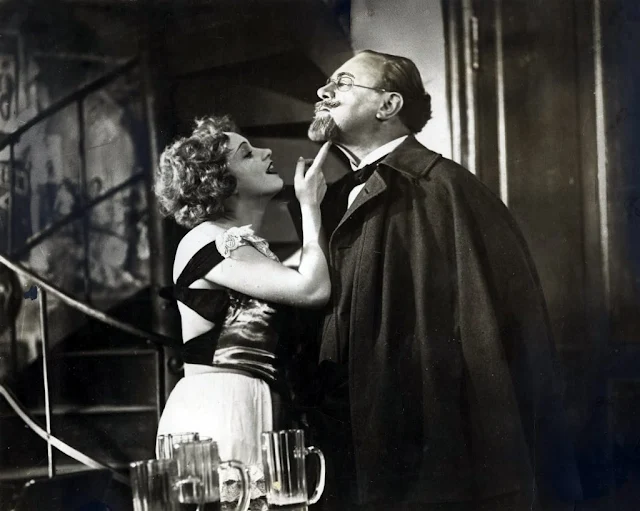 |
| Betty Compson and George Bancroft in The Docks of New York |
Cast: George Bancroft, Betty Compson, Olga Baclanova, Clyde Cook, Mitchell Lewis, Gustav von Seyffertitz. Screenplay: Jules Furthman, based on a story by John Monk Saunders; titles: Julian Johnson. Cinematography: Harold Rosson. Art direction: Hans Dreier. Film editing: Helen Lewis.
Josef von Sternberg is mostly remembered today for his fetishization of Marlene Dietrich in romances with glamorous settings like Morocco (1930) and Shanghai Express (1932), but The Docks of New York shows that Sternberg could handle grit as well as glamour. If it's not as well known as the Dietrich films, it's partly because it was largely overlooked at the time of its release because of the flurry of interest in talkies -- it's one of the last important silent movies. But it's as strikingly visual in its way as the more opulent Sternberg movies, with the collaboration of director, cinematographer Harold Rosson, and art director Hans Dreier giving a solid story by Jules Furthman -- who also wrote Morocco and Shanghai Express -- the right flavor. Bill Roberts (George Bancroft), the burly stoker on a tramp steamer, goes ashore for a one-night leave in New York, after being warned by the engineer, Andy (Mitchell Lewis), not to come back drunk. Not one to follow his own advice, Andy then goes to a waterfront dive called the Sandbar where he is surprised to meet his wife, Lou (Olga Baclanova), whom he has abandoned. Meanwhile, Bill rescues a suicidal prostitute named Mae (Betty Compson), when she tries to drown herself, and takes the unconscious woman to a room above the Sandbar. Lou comes to the room to aid in reviving Mae while Bill goes to find some clothes for her. He steals them from a closed pawn shop and returns to find a revived Mae, who turns out to be quite pretty. They go down to the bar, where Andy puts the moves on Mae and gets into a fight with Bill, which Andy loses. Two lost souls, Mae and Bill are attracted to each other, and in a kind of what the hell way, he proposes marriage. They talk wistfully about his giving up the life at sea, and she accepts. A waterfront missionary (Gustav von Seyffertitz) performs the ceremony in the bar. But the next morning Bill has second thoughts and leaves for the ship while Mae is still asleep. Andy, however, still smarting from the beating Bill gave him, goes to the room, where Mae has discovered Bill has left her. She refuses Andy's advances and he tries to rape her, only to be shot by Lou, who has arrived just in time. Seeing the commotion outside the Sandbar, Bill returns to the scene, where he and Mae say their farewell. But when the ship sails, Bill thinks better of it, jumps overboard and swims to shore, where he finds that Mae has been arrested for stealing the clothes from the pawn shop. He confesses to the crime and is sentenced to jail, promising to Mae that he'll return once he serves his sentence. This is solid melodrama stuff, elevated by the performances, which establish the essential loneliness that unites Bill and Mae, and by the fine production values.







